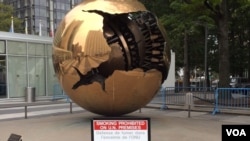President Robert Mugabe Monday addressed the 70th session of the United Nations General Assembly and reiterated his opposition to same sex marriages.
Mr. Mugabe said, “We equally reject attempts to prescribe 'new rights' that are contrary to our values, norms, traditions, and beliefs. We are not gays! Cooperation and respect for each other will advance the cause of human rights worldwide. Confrontation, vilification, and double-standards will not.”
The remarks by Mr. Mugabe were in sharp contrast to what American President Barack Obama said at the same podium hours earlier. “In this country, everybody can contribute, everybody can participate no matter who they are, or what they look like, or who they love,” said Obama, adding “that’s what makes us strong.”
Mr. Mugabe's remarks were number five of the most downloaded and most read speeches on the UN website.
All the major international media networks captured President Mugabe’s remarks and these included, CNN which had a headline quoting Mr. Mugabe’s remarks, “World Leader to U.N.: We are not gays”.
The UK Independent newspaper also reported on Mr. Mugabe’s remarks.
The newspaper wrote that Mr. Mugabe’s government has one of the worst rights records on the African continent for the Lesbians, Gays, Bi-Sexual and Transgender (LGBT) community.
OTHER MEDIA
The British Telegraph also covered the story. The paper is quoted saying in part, “The Zimbabwean president strayed from his script in startling fashion on Monday evening and blurted out, “We are not gays” during his UN General Assembly speech.”
The Huffington Post made similar observations on Mr. Mugabe, noting that “President Robert Mugabe deviated from his prepared speech at the UN General Assembly in New York on Monday, while discussing human rights.”
The NewsDay in Zimbabwe was not left out. It covered Mr. Mugabe’s remarks as did other newspapers in Africa, Asia and Europe.
Mr. Mugabe’s call for reform of the Security Council seems to have resonated well with many developing nations.
The United Nations has only five nations with veto powers the so-called big five - China, the United States of America, France, Russia and Britain.
But developing nations are pushing for reforms so they can have a say in the running of the organization.
PRESIDENT ZUMA
South African president Jacob Zuma made similar remarks in his address to the United Nations. “It is unacceptable and unjustifiable that more than one billion people in the African continent are still excluded as permanent members of the key decision-making structure of the United Nations, the Security Council.
“A continent with a smaller population than Africa is represented by three countries on the UN Security Council,” said President Zuma.
Several Latin American and Caribbean leaders, including Chilean President Michell Bachelet, also called for the reform of U.N bodies.
She said, “In 2014 and 2015, we have been a non-permanent member of the Security Council. In light of this experience, we wish to reaffirm our belief in the need to reform the Council by increasing the number of its permanent members and reducing the veto, at least in the cases of crimes against humanity.”
TARGETED SANCTIONS
Mr. Mugabe also called upon Washington and other western nations to remove targeted sanctions against Harare.
He reiterated that Harare is willing to do business with the West. Mr. Mugabe has for years used every opportunity to criticize Washington over the sanctions, saying they have been responsible for his country's economic woes and are aimed at inciting Zimbabweans to overthrow the government.
But diplomatic sources told VOA that Washington will maintain sanctions on Zimbabwe until the southern African nation improves its human rights record and holds credible elections.
The U.S. imposed sanctions on Zimbabwe in 2001 for gross human rights violations but Harare denies the charge saying they were a direct result of its land reform program that it says took farms from the minority whites to parcel them out to the majority blacks.
Lastly, the president talked about the need to promote the rights of women.
Mr. Mugabe said, “The promotion of gender equality is critical for the realization of the Post 2015 Development Agenda.
The African Union designated 2015 “The Year of the Advancement of Women Empowerment and Development Towards Agenda 2063”.
EARLY CHILD MARRIAGES
Reacting, human rights lawyer, Nyaradzayi Gumbonzvanda, who is attending top level meetings at the U.N General Assembly, said African leaders must act on their words.
She said, “Commitments are important but insufficient if they are not followed through by necessary resources, quality delivery of services and building capabilities of individuals and households to overcome poverty.”
She added, “Gender inequalities are a reflection of disparities in society not only between men and women, but also between the rich and poor. Painful statistics of the 15 million girls subjected to sexual violations, exploitation and abuse, commonly referred to practice of forced marriage is a case in point.”
Mr. Mugabe is expected to fly back to Harare on Wednesday afternoon.















